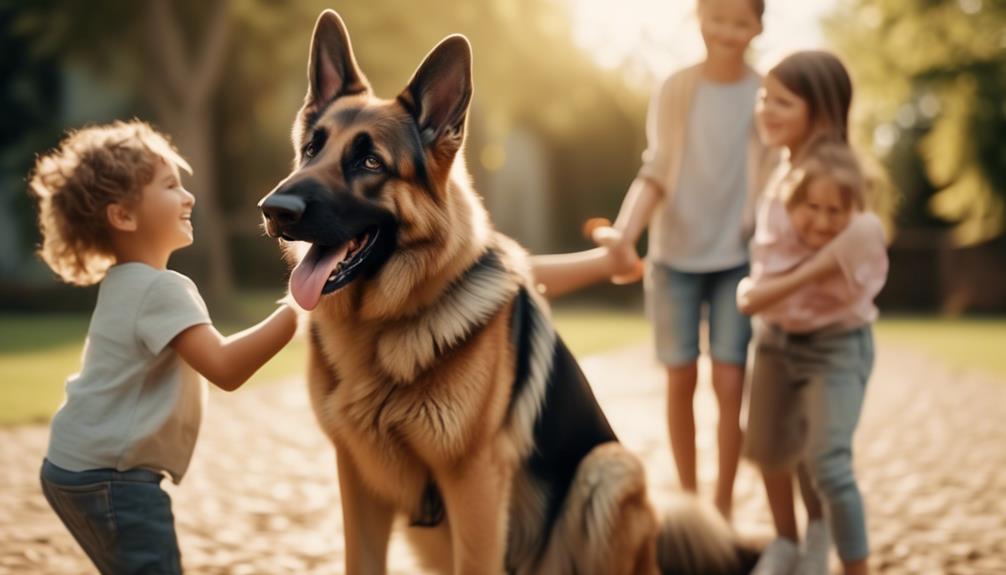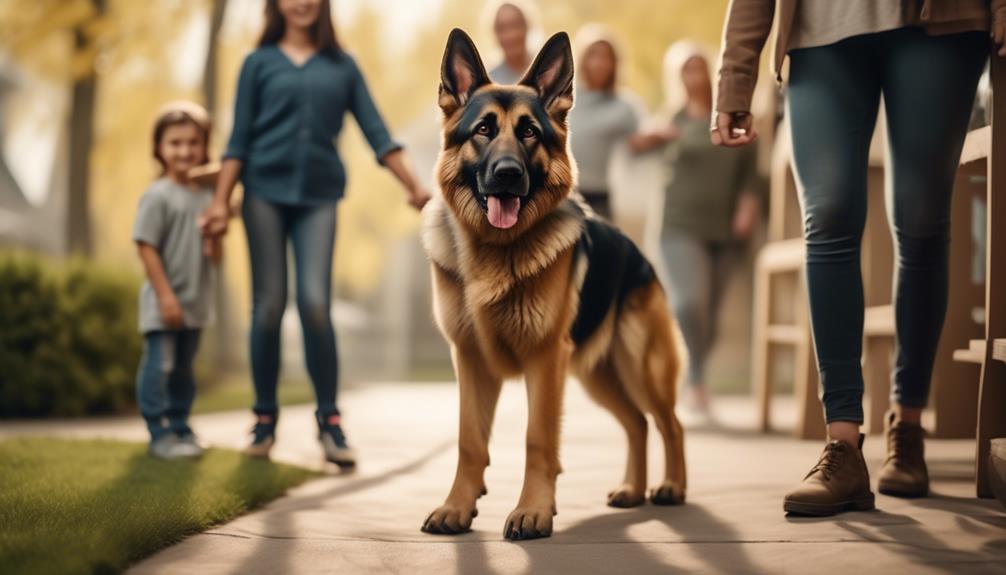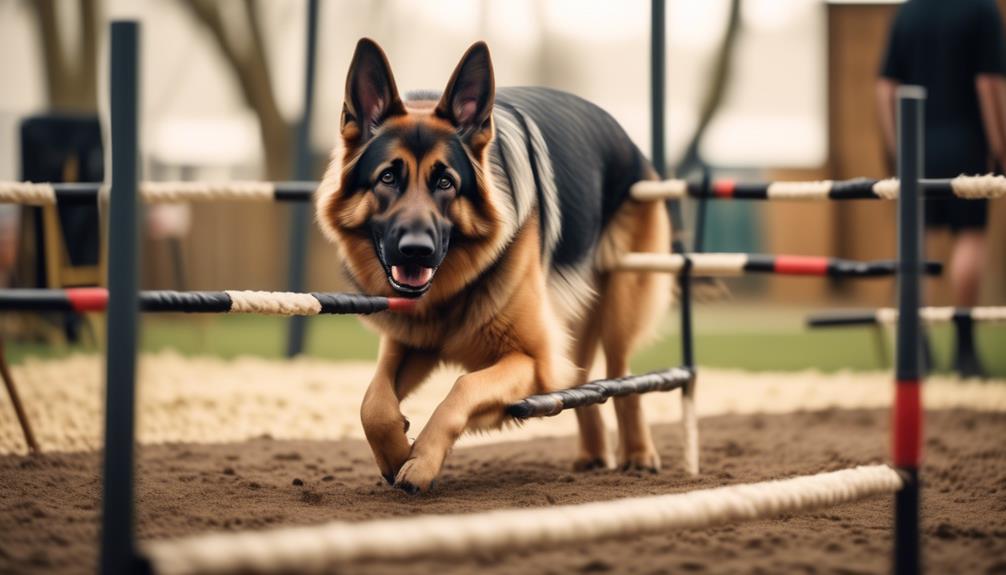With their keen senses and unwavering loyalty, German Shepherds are the steadfast guardians of the canine world. Like a watchful sentinel, they stand tall, ready to protect and serve those they hold dear.
But beyond their noble appearance lies a complexity that intrigues both dog enthusiasts and casual observers alike. As this discussion unfolds, the multifaceted nature of the German Shepherd Dog will be unveiled, revealing a breed that is not only a symbol of loyalty but also an embodiment of intelligence, versatility, and unwavering devotion.
Key Takeaways
- German Shepherd Dogs are known for their intelligence, loyalty, and protective instincts.
- They require exercise, training, and mental stimulation to thrive as family pets.
- It is important to prioritize adopting from rescue organizations or shelters, or choose a reputable breeder if purchasing.
- Prospective owners should understand the responsibilities and commitment involved, as well as the compatibility with their lifestyle and family.
German Shepherd Dog Characteristics
German Shepherd Dogs are a medium to large size breed known for their intelligence, loyalty, and protective instincts. They're often used as working dogs in various roles, including search and rescue, police work, and service animals.
As family pets, German Shepherds are a symbol of loyalty and dedication. They possess protective instincts and have an affectionate nature towards their owners. Their boundless energy and intelligence make them cherished companions.
However, it's important to note that German Shepherds require regular exercise and training to channel their energy effectively. They thrive in homes that provide them with time, patience, and love.
With their exceptional blend of intelligence and devotion, German Shepherds make excellent family pets for those who are willing to meet their needs.
German Shepherd Dog as Family Pets

With their impressive intelligence and unwavering loyalty, German Shepherd Dogs have earned a reputation as cherished family pets. Their protective instincts and affectionate nature make them ideal companions for families. German Shepherds are known for their boundless energy and intelligence, which require regular exercise and mental stimulation. They bring a remarkable blend of intelligence and devotion to their families, making them highly valued members of the household. To emphasize their suitability as family pets, consider the following table:
| German Shepherd Dogs as Family Pets |
|---|
| – Symbol of loyalty and dedication |
| – Protective instincts and affectionate nature |
| – Boundless energy and intelligence |
| – Make cherished family pets |
When considering the adoption of a German Shepherd Dog, it is important to prioritize adopting from rescue organizations or shelters. If purchasing from a breeder, thorough research on ethical practices and choosing a reputable breeder is crucial to ensure the health and temperament of the dog. German Shepherd Dogs require responsible ownership, including providing ample exercise, training, and socialization to meet their needs.
Adopting a German Shepherd Dog

When considering bringing a German Shepherd Dog into your home, it's important to prioritize adoption from rescue organizations or shelters to provide a loving home to a dog in need. Adopting a German Shepherd Dog not only gives an opportunity to save a life but also offers several advantages.
- Saving a life: By adopting from rescue organizations or shelters, you're giving a second chance to a dog that may have been abandoned or mistreated.
- Health and temperament: Reputable breeders prioritize the health and temperament of their dogs, ensuring that you adopt a well-adjusted and healthy companion.
- Ethical practices: By conducting thorough research on ethical practices, you can ensure that you're supporting responsible breeding and not contributing to puppy mills or unethical breeding practices.
- Fulfillment: Providing a loving home to a dog in need can be a rewarding experience, both for you and the dog. The bond formed through adoption can be strong and fulfilling.
Considerations Before Getting a German Shepherd Dog

Prior to bringing a German Shepherd Dog into your home, it is important to consider several key factors. The table below provides a visual representation of these considerations:
| Considerations | Description |
|---|---|
| Responsibilities and commitment | German Shepherds require time, attention, and care. They thrive in an environment where they have a job or purpose. |
| Exercise and mental stimulation needs | These dogs have high energy levels and require regular exercise and mental stimulation to prevent boredom and promote overall well-being. |
| Training requirements | German Shepherds are intelligent and trainable, but they need consistent training and socialization from an early age. |
| Protective instincts and energy levels | With their protective nature, German Shepherds can be wary of strangers and exhibit high levels of energy. Owners must be prepared for this and provide proper guidance and outlets for their energy. |
| Compatibility with lifestyle and family | Consider whether a German Shepherd's exercise needs, size, and temperament align with your living situation and family dynamics.
Quick Facts About German Shepherd Dogs

German Shepherd Dogs, originating in Germany, are a medium to large size breed known for their loyalty, intelligence, and protective instincts. Here are some quick facts about German Shepherd Dogs:
- Size: Adult males stand around 24 to 26 inches at the shoulder, while adult females range from 22 to 24 inches.
- Weight: German Shepherds can weigh anywhere between 50 to 90 pounds.
- Group: They belong to the Herding Group, which reflects their original purpose as working dogs.
- Lifespan: The average lifespan of a German Shepherd Dog is typically 9 to 13 years.
These facts highlight the physical characteristics and group classification of German Shepherd Dogs. Their size and weight make them a substantial breed, while their herding background contributes to their intelligence and protective instincts. Understanding these quick facts can help potential owners make informed decisions about whether a German Shepherd Dog is the right fit for their lifestyle and family.
Intelligence and Trainability

Intelligence and trainability are defining characteristics of the German Shepherd Dog breed. German Shepherds are known for their exceptional cognitive abilities and willingness to learn. They are quick to understand commands and can excel in various training tasks. A combination of their intelligence and trainability makes them highly suitable for working roles such as search and rescue, police, and service dogs. German Shepherds have a strong work ethic and thrive when given mental stimulation and challenging tasks. They are capable of learning complex commands and performing intricate tasks with precision. This breed's intelligence and trainability are further highlighted when comparing them to other breeds. The following table illustrates the intelligence and trainability rankings of popular dog breeds, with the German Shepherd Dog consistently ranking high in both categories:
| Breed | Intelligence Ranking | Trainability Ranking |
|---|---|---|
| German Shepherd Dog | 3 | 3 |
| Border Collie | 1 | 1 |
| Poodle | 2 | 2 |
| Golden Retriever | 4 | 4 |
The German Shepherd Dog's intelligence and trainability make them versatile and adaptable companions, capable of excelling in a variety of environments and tasks.
Exercise and Mental Stimulation Needs

To ensure the well-being of German Shepherd Dogs, it's important to meet their exercise and mental stimulation needs on a regular basis. German Shepherds are high-energy dogs that require ample physical activity to prevent boredom and promote their overall well-being. Additionally, their intelligent and active minds need mental stimulation to stay happy and healthy.
Here are four key points to consider when addressing the exercise and mental stimulation needs of German Shepherd Dogs:
- Daily Exercise: German Shepherds thrive on daily exercise, including long walks, runs, and opportunities to play and explore. Regular physical activity helps them release energy, maintain a healthy weight, and prevent behavioral problems.
- Mental Stimulation: Providing mental challenges through training, puzzle toys, and interactive games is crucial for German Shepherds. This breed excels in tasks that engage their intelligence, problem-solving abilities, and focus.
- Variety in Activities: German Shepherds enjoy a variety of activities that stimulate their bodies and minds. Incorporating activities such as agility training, obedience training, scent work, and fetch can keep them mentally and physically engaged.
- Consistency and Routine: Establishing a consistent exercise and mental stimulation routine is essential for German Shepherds. Regularity in their daily activities helps them feel secure, reduces anxiety, and enhances their overall well-being.
Health and Care Tips

Taking proper care of a German Shepherd Dog's health is crucial for their overall well-being. This breed is generally healthy, but like all dogs, they're prone to certain health conditions. Regular veterinary check-ups, vaccinations, and preventive measures are essential to maintain their optimal health.
German Shepherds are prone to hip and elbow dysplasia, so it's important to provide them with a balanced diet and regular exercise to keep their joints strong. Additionally, they may be susceptible to certain genetic conditions such as degenerative myelopathy and bloat, so early detection and appropriate management are necessary.
Regular grooming, including brushing their double coat and cleaning their ears, can help prevent skin infections and maintain their overall hygiene.
Socialization and Obedience Training

Socialization and obedience training play a crucial role in shaping the behavior and temperament of a German Shepherd Dog. Proper socialization helps them develop positive behaviors and interactions with people, other animals, and different environments.
Obedience training establishes clear boundaries, improves their responsiveness to commands, and enhances their overall obedience.
Here are four key reasons why socialization and obedience training are essential for German Shepherds:
- Prevents aggression: Early socialization exposes German Shepherds to various stimuli, reducing the likelihood of fear-based aggression towards unfamiliar people or situations.
- Enhances adaptability: Through socialization, German Shepherds learn to adapt to different environments, which can prevent anxiety and stress when faced with new experiences.
- Promotes good behavior: Obedience training teaches German Shepherds basic commands, such as sit, stay, and come, improving their overall behavior and responsiveness.
- Builds trust and bonding: Training sessions provide opportunities for the owner and the dog to strengthen their bond, fostering trust and mutual understanding.
Grooming and Coat Care

After establishing a strong foundation through socialization and obedience training, it's important to understand the grooming and coat care needs of a German Shepherd Dog.
This breed has a double coat that requires regular maintenance to keep it healthy and looking its best. The outer coat is dense and harsh, while the undercoat is soft and thick.
German Shepherds shed heavily twice a year, known as 'blowing their coat,' and during this time, daily brushing is necessary to remove loose hair and prevent matting. Additionally, regular brushing helps distribute the natural oils in the coat, promoting a healthy shine.
Bathing should be done as needed, using a dog-specific shampoo to avoid drying out the skin. It's also important to check the ears regularly for debris and to trim the nails regularly to keep them at a comfortable length.
Feeding and Nutrition Guidelines

To ensure the overall health and well-being of a German Shepherd Dog, it's crucial to provide a balanced and nutritious diet. Here are some feeding and nutrition guidelines to consider:
- High-quality dog food: Choose a reputable brand that meets the nutritional needs of German Shepherds. Look for a formula specifically designed for large breed dogs.
- Balanced diet: Provide a combination of protein, carbohydrates, and fats to support your dog's energy levels and muscle development. Ensure the food contains essential vitamins and minerals.
- Portion control: German Shepherds can be prone to obesity, so it's important to measure their food and avoid overfeeding. Consult your veterinarian for appropriate portion sizes based on your dog's age, weight, and activity level.
- Avoid harmful ingredients: Steer clear of foods with artificial additives, preservatives, and fillers. Opt for natural ingredients and avoid common allergens such as wheat, soy, and corn.
Common Health Issues in German Shepherds

Moving on to the topic of the health of German Shepherds, it is important to be aware of the common health issues that can affect this breed. German Shepherds are generally a healthy breed, but like all dogs, they are prone to certain health conditions. By understanding these common health issues, owners can take proactive measures to keep their German Shepherds happy and healthy.
Below is a table highlighting some of the most common health issues in German Shepherds:
| Health Issue | Description | Treatment |
|---|---|---|
| Hip Dysplasia | Abnormal formation of hip joints | Medications, physical therapy, surgery |
| Degenerative Myelopathy | Progressive degeneration of the spinal cord | Supportive care, physical therapy |
| Gastric Dilatation-Volvulus | Stomach bloating and twisting | Emergency surgery |
| Exocrine Pancreatic Insufficiency | Inability to properly digest food | Enzyme replacement therapy |
| Degenerative Joint Disease | Chronic inflammation and deterioration of joints | Medications, physical therapy, joint supplements |
It is important for German Shepherd owners to work closely with their veterinarians to monitor their dog's health and address any health issues promptly. Regular check-ups, a balanced diet, and regular exercise can also contribute to the overall well-being of German Shepherds.
Tips for Building a Strong Bond With Your German Shepherd

Building a strong bond with your German Shepherd is essential for fostering a harmonious and fulfilling relationship. Here are four tips to help you build that bond:
- Spend quality time together: Regularly engage in activities that your German Shepherd enjoys, such as going for walks, playing fetch, or participating in training sessions. This won't only provide physical exercise but also mental stimulation, helping to strengthen the bond between you.
- Use positive reinforcement: Reward your German Shepherd for good behavior with treats, praise, and affection. Positive reinforcement techniques, such as clicker training, can help build trust and create a positive association with you as their owner.
- Establish clear communication: Learn to understand your German Shepherd's body language and vocal cues. This will help you anticipate their needs, address any concerns, and strengthen the lines of communication between you.
- Be consistent and patient: Consistency in training and daily routines is important for your German Shepherd's sense of security and trust. Patience is key when building a bond, as it takes time for your German Shepherd to feel comfortable and develop a deep connection with you.
Frequently Asked Questions
How Long Does It Take to Train a German Shepherd Dog?
Training duration for a German Shepherd dog varies depending on factors like the dog's age, previous training, and individual temperament. Consistency, positive reinforcement, and structured training sessions can help expedite the process.
Are German Shepherds Good With Small Children?
German Shepherds are generally good with small children. They have a protective nature and are known for their loyalty and affection. However, it is important to supervise interactions and ensure proper socialization and training.
Do German Shepherds Need a Lot of Space to Live?
German Shepherds don't require excessive space to live, but they do need enough room to move around comfortably. Regular exercise and mental stimulation are more important for their well-being and happiness.
Are German Shepherds Prone to Any Specific Health Issues?
German Shepherds are prone to certain health issues. These can include hip and elbow dysplasia, degenerative myelopathy, and various genetic conditions. Regular veterinary check-ups and a healthy lifestyle can help mitigate these risks.
How Much Exercise Does a German Shepherd Dog Need on a Daily Basis?
A German Shepherd Dog needs at least 1 to 2 hours of exercise daily. Regular physical activity is essential for their well-being and mental stimulation. Engaging in activities such as walking, running, and playing can help meet their exercise needs.
How Does the Central Asian Shepherd Dog Compare to the German Shepherd Dog?
The central asian shepherd dog breed is known for its impressive size and strength, while the german shepherd dog is prized for its intelligence and versatility. Both breeds excel as guard dogs and are devoted to their families. The central asian shepherd is more aloof with strangers, while the german shepherd is more outgoing.
Conclusion
In conclusion, German Shepherd Dogs are highly intelligent and loyal companions that require ample exercise and training to thrive in a home environment. They excel in various working roles and are cherished family pets due to their protective instincts and affectionate nature. When considering adopting a German Shepherd, it's important to prioritize rescue organizations or reputable breeders that prioritize the dog's health and temperament. Additionally, understanding their exercise needs and compatibility with the owner's lifestyle is crucial.
An interesting statistic shows that German Shepherds are ranked as the second most popular dog breed in the United States.




